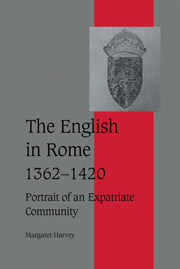Book contents
- Frontmatter
- Contents
- Acknowledgements
- List of abbreviations
- Maps
- Introduction
- 1 The setting I: Rome in the later fourteenth century, 1362–1376
- 2 The setting II: Rome, 1376–1420
- 3 S Thomas's hospice
- 4 S Chrysogonus' hospice and other enterprises
- 5 The laity in Rome
- 6 Women
- 7 The English in the curia 1378–1420: I
- 8 The English in the curia 1378–1420: II
- 9 The career of John Fraunceys
- 10 Adam Easton, an English cardinal: his career
- 11 Adam Easton's ideas and their sources
- 12 Conclusion
- Bibliography
- Index
- Cambridge Studies in Medieval Life and Thought Fourth Series
7 - The English in the curia 1378–1420: I
Published online by Cambridge University Press: 28 July 2009
- Frontmatter
- Contents
- Acknowledgements
- List of abbreviations
- Maps
- Introduction
- 1 The setting I: Rome in the later fourteenth century, 1362–1376
- 2 The setting II: Rome, 1376–1420
- 3 S Thomas's hospice
- 4 S Chrysogonus' hospice and other enterprises
- 5 The laity in Rome
- 6 Women
- 7 The English in the curia 1378–1420: I
- 8 The English in the curia 1378–1420: II
- 9 The career of John Fraunceys
- 10 Adam Easton, an English cardinal: his career
- 11 Adam Easton's ideas and their sources
- 12 Conclusion
- Bibliography
- Index
- Cambridge Studies in Medieval Life and Thought Fourth Series
Summary
The return of the curia to Rome in 1376, followed so soon thereafter by schism may have been a disaster for the Western Church but it was a boon for some non-Italian clergy. Many former members refused to leave Avignon or fled back there once the schism hardened. The vacuum, both among the cardinals and in the lower levels of administration, had to be filled and was largely supplied from nations remaining loyal to the Roman popes. Thus many Germans obtained curial posts, whereas the French, so numerous during the Avignon exile, become far fewer. After the first few years English numbers in Rome also increased, though never so much as Germans, for reasons explored below. What follows discusses the careers and prospects of the most important English holders of curial posts.
The curia can be divided into the papal and cardinals' households proper and the administration of the wider church. The administration was divided into the judiciary, departments which granted favours, which dealt with finance and which administered the results, particularly sending out bulls. Between 1378 and 1420 much was changing and spheres were less clear than later; under stress of schism men became pluralists, but these rough distinctions still held.
The Rota was the central court of the curia where, in particular, benefice cases were decided. Its judges, auditores sacri apostolici palacii, were papal chaplains, enjoying the privileges and benefits of being papal familiares. Between 1378 and 1420 fifteen Englishmen were auditors, though in some cases very briefly.
- Type
- Chapter
- Information
- The English in Rome, 1362–1420Portrait of an Expatriate Community, pp. 132 - 148Publisher: Cambridge University PressPrint publication year: 2000



